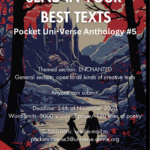Sometimes We Break So Beautifully (Nightfall)
by Liz Culture
A cold wind greets me as I leave the company building, so biting it makes me puff my scarf up a bit more around my neck. It was raining for the better part of the day, leaving the ground wet and glistening. With every step, my boots make a squelching sound that cuts through the backdrop of the bustling city around me. It’s a rustling sound, a restless murmur, busy, crisp in the clear air. Even now that the day is slowly waning, with the sun’s light getting weaker, the energy around me doesn’t calm down.
Despite my feeling tired and worn out, I try to blend in seamlessly. I quicken my steps and bury my bare hands in the pockets of my coat to keep them warm, duck my head just enough to not have to look at anybody. Dusk is slowly settling, the contours of people blurring with wet, washed-out walls and doorways. Only now that the light is diminishing, passing headlights and the colorful neon signs everywhere become vibrant and eye-catching.
The route I’m walking is so familiar to me that I don’t have to think about it at all. My mind is still caught up with work matters, an unpleasant conversation I had with a coworker, the deadline I need to meet, and the extra project I took on to help out, and I’m so engrossed in my own thoughts it surprises me when I recognize my destination. It’s a square in a pedestrian area that used to be utilized for a small town fair every summer. Eventually the fair stopped, but the merry-go-round was never taken down. And so it still stands there, an old thing that has been out of service for ages, the paint chipping in many places, the smiles of the animals eternally frozen into place.
At least it’s something warm. Whereas the streetlamps emit a harsh white light, the merry-go-round is illuminated with yellow light, its warmth making the golden paint that still remains look regal, making the reds and blues and purples of the animals look vivid and inviting. It’s almost like the laughter of bygone times is still audible in that one beam of light, like stepping into it will bring up memories, not my own but good ones, happier ones.
My feet automatically stop in front of the merry-go-round. I’ve been here so many times before, spent so much time in front of this piece of scrap waiting for someone–friends, family, my girlfriend. The footsteps of people hurrying by sound equally as wet as mine did, and there are still raindrops dripping from benches and bins and lamps and the merry-go-round. The wet cold is uncomfortable even with the way I’m bundled up warmly, seeping in at the same speed the dark settles, slow but inexorable.
A pair of footsteps approach, one I’d recognize anywhere. “Alena,” I greet as I turn around, my face already relaxing into a smile, the cold loosening its grip from my limbs a bit, “Hi.”
“Hey.” My girlfriend stops a few steps away from me, so I close the distance and take one hand out to cup her face. She stays still as I press a short kiss to her cold lips. It feels a bit awkward that way, with no reciprocity, no pressure, as if the touch surprised her.
“How was your day?” I ask as I take a small step back. I expect her to reach out one of her hands for me to hold as she usually does, but both of them stay buried in her coat pockets. I mentally shrug and stuff my hand back into my own coat as well, the skin already turning red and prickly with the cold. “Was work okay?”
After a hesitant moment, Alena nods once. “Yeah, it was okay.” She looks at the merry-go-round, as if in thought, but doesn’t elaborate even moments later.
“How did your presentation go?” I prompt cautiously. If she’s this unwilling to talk about something without being nudged, it usually means it’s bothering her. “The project really is rather tricky. Did someone agree that the objective might be a bit too ambitious?”
“Ah, well,” Alena starts. She looks at me for a second, and then her eyes flit over my face like she’s searching for something before she looks back to the side. “It went okay.” I raise my eyebrows in anticipation, expecting more of an explanation, or a rant, any sort of emotion, but just as I open my mouth to ask about it, she looks at me sharply. “I’ve got something important I need to tell you.”
That surprises me into silence for a long moment. “Okay, sure,” I say next. I have no idea what to expect. Another issue at work, maybe? Something with her family? I can’t even tell if it’s a good thing or a bad one she’s about to tell me. Her face is an impassive mask, something I’ve rarely ever seen on her before. “What is it?”
She takes a deep breath and lets her shoulders drop as she blows it out with a woosh. “I think we should break up.”
All thoughts in my mind white out. The cold seeps into my body, makes a home in my bones and grips my heart. I feel my heartbeat in my throat, a lump forming around it, something large and heavy and uncomfortable that obstructs my airways.
“It’s not that I resent you or anything,” Alena hurries to add. “Or that our relationship was bad.” She smiles, and I can find nothing but hollow shadows in it, as if it were a mask, something stilted, muscles pulling into unnatural directions. “But, I think–I don’t know. It’s simply time to move on, don’t you think?”…
Read the full story in Nightfall, coming out on May 10th!
It’s Burn-out, Baby (General)
by Magdalena Schwingenschrot
Automated heart is beating
Round the clock, no time for grievance.
Are you, are you functional?
Did you ever mourn your soul?
Automatic heart has rusted.
Worked so hard, it must have busted.
Worked so hard, but not enough.
Can you see the falling graph?
Automated heart is leaking,
Screws got loose and start their squeaking.
Cheerful is their marching beat,
March to slaughter like they’re sheep.
Automatic hearts no more.
Leaving but a trail of oil,
Leaving naught but emptiness,
Looking for a mess that’s theirs.








